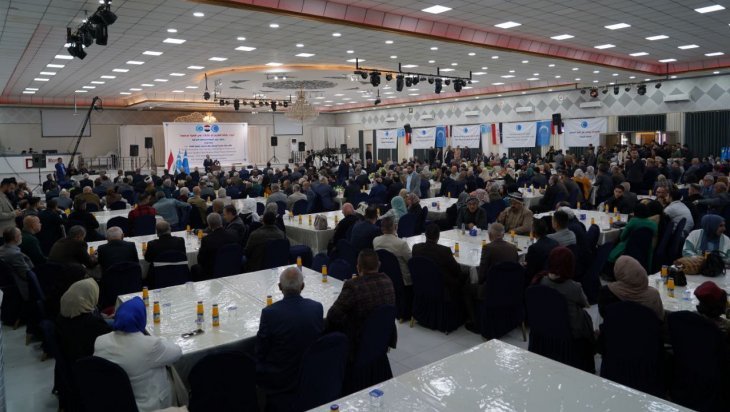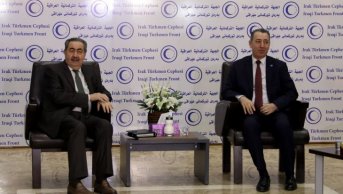Al Sudani’s Goverment Program and the Possible Risks Ahead for Iraqi Turkmen

Due to the disagreement among the political forces in Iraq, it was not possible to form a government during the almost one-year period following the parliamentary elections held in 2021. 21 out of 23 ministers of the government formed by Mohammed Shia Al-Sudani, the candidate of the Shiite Coordination Framework, known to be supported by Iran, obtained a vote of confidence at the Parliament’s session on October 27, 2022. The Sudani cabinet took office after obtaining the approval of 253 members of the Iraqi Parliament, which has 329 members in total. Iraqi Turkmen were denied representation in Sudan’s government which was given a vote of confidence by the Parliament. Before the formation of the Sudanese government, the State Administration Coalition was established with the participation of Shiite, Sunni, and Kurdish Parties. Turkmen people, the third basic element in the components of the Iraqi people (according to the Iraqi constitution), were not allowed to participate in the coalition, and they showed a harsh reaction to this situation. The non-existence, in the cabinet of Mohammed Shite Al-Sudani, of anybody who was on the list of the United Front of Iraqi Turkmen, and supported by Turkmen Parties could be attributed to the fact that the candidate of the Sunni pole of the State Administration Coalition, Sabit el-Abbasi, was of Turkmen descent. In a similar fashion, there are issues/items in the government program declared by Al Sudani, that could lead to situations against the interests of Turkmen people,
Sudan’s Government Program and the Iraqi Turkmens
Shiite, Sunni, and Kurds, who took part in the State Administration Coalition established in the absence of the Turkmen, have determined the program of Sudan’s government in line with their political goals. Some of the items in the program pose risks for Turkmen people. One of them is to allow Kurdish political parties to operate once again in Kirkuk, Salah-al Din, Nineveh, and Diyala provinces. Because of this article, which is included in the government program, unsolved murders were committed against Turkmens; psychological pressures and policies of intimidation were applied, and there were arrests without court orders in the provinces of Kirkuk, Salah Al-Din, Nineveh, and Diyala under the administration of the Iraqi Kurdish Regional Government (KRG) between 2003-2017. Implementation of this item in the government program may lead to instability and the deterioration of the security situation in these regions with mixed ethnicity.
Revive Article 140 again
Another item in the government program that poses a risk for Turkmen is the re-implementation of the controversial Article 140 of the Iraqi Constitution, which was written under the leadership of the civilian administrator Paul Bremer, who had been appointed after the invasion of Iraq by the United States of America in 2005. According to Article 140 of the Constitution, normalization, a census, and a referendum had to be held in the provinces of Kirkuk, Salah Al-Din, Nineveh, and Diyala, which were mentioned as controversial regions in the constitution, and this article had to be implemented by the end of 2007. However, this article could not be implemented and lost its legitimacy despite all the efforts and policies of the KRG due to the objections of the countries in the region.
Turkmen and Arabs living in the region objected to this article. The President of the Iraqi Turkmen Front (ITF), Hasan Turan, made a statement regarding this article. In his statement, Turan said that since the time when the 140th article of the Iraqi Constitution was written in 2005, it had not been possible to find a permanent solution to the Kirkuk problem and that although it was related to Kirkuk and its inhabitants, this article had been written against the will of the Turkmen and Arabs living there. Turan stated that for the last 3 years, meetings had been held under the supervision of the United Nations (UN) in order to achieve reconciliation between all groups in Kirkuk, and that he believed that these negotiations would result in a "common administration," "special status" given to the city under Baghdad’s control, and the return of the seized lands to their owners, the Turkmen.
It would be appropriate to say that the reason for the KRG's desire to revive Article 140 is that, rather than regaining dominance in the disputed areas where Turkmen live intensely, the enactment of the Oil and Natural Gas Law, which is included in the government program, and the passage of the Oil and Natural Gas Law in the Iraqi Parliament are dependent on political compromises to be made. KRG could be the key point for these political arrangements. Therefore, KRG, through Article 140, aims to ensure the sale of the oil obtained from the oil-rich Kirkuk wells as it was possible before October 16, 2017. The KRG, which will be an important factor in the way towards the enactment of the Petroleum and Natural Gas Law, is probably trying to make Article 140 enter into force before this law is enacted. In this way, it could first dominate the oil wells and then help the passage of the oil law through Parliament. This is so because it is possible for the KRG to gain an advantage by operating the wells in the Kirkuk oil field. Both the KRG and the central government know that the implementation of Article 140 is difficult due to its content rather than due to legal impediments. However, the KRG can use this article as a pressure tool to obtain additional advantages while enacting the Oil and Natural Gas laws.
Given the fact that the main objective of Article 140 to be implemented is to facilitate the KRG's penetration of Kirkuk oil, this could also cause major problems between the PUK, the KDP, and the Kurdish community in general. In the event of the revitalization of this article, PUK may want to take Kirkuk and other disputed areas under its control once again and benefit from the underground richness of the region. From this point of view, it may seem difficult for the KDP to allow these regions, known for their underground richness, to be controlled by the PUK.
The revival of Article 140, especially with the application of the new government's program, may lead to Turkmen-Arab and Arab-Kurdish clashes, especially in the Kirkuk region. Although most of the agricultural lands used to be owned by the Turkmen population during the Saddam Hussein regime, these lands have been taken from the Turkmen and then leased to the Arabs under several pretexts, such as land reform, in line with the details of the aforementioned article. In this context, terrorist activities have recently started in Kirkuk, which had been partially stabilized in terms of security after 2017.
In fact, 11 soldiers lost their lives as a result of the explosion, on December 18, 2022, of a bomb previously placed on the road by the terrorist organization ISIS, during the patrol of the Iraqi Federal Police Forces in the Safra Village of Riyadh Sub-district, located in the south of Kirkuk. Two days after this incident, five civilians lost their lives due to ISIS attacks in Diyala province, which is also among the disputed regions. It is possible that the fate of the disputed areas could be renegotiated due to these attacks while Article 140 is kept on the political agenda of the country. As a matter of fact, ITF Kirkuk Deputy Erşat Salihi has made an appeal to Prime Minister Sudani regarding these attacks. Salihi expressed the following: “We have openly brought this issue to the attention of the Iraqi Prime Minister several times. Kirkuk is a very sensitive area. The security of Iraq depends on the security of Kirkuk. We have a feeling that some parties want to undermine the security of Kirkuk and turn it into a political bargain. We warn the Prime Minister once again; Do not neglect the political and security issues in Kirkuk. At this point, the KRG may use the recent attacks in Kirkuk as a pretext to deploy Peshmerga forces to Kirkuk on the grounds of closing the security gap in the region.
Another important item included in the program of the Sudani government which is closely related to the Turkmen living in Kirkuk is the local elections to be held in Kirkuk. Regarding this issue, in a recent television interview, Nouri Al-Maliki, the former prime minister and the leader of the State of Law Coalition, which plays a leading role in the Shiite Coordination Framework, stated the following in a television program: “The criterion for the governorship elections envisages that the governor is elected from the ethnic groups that won the most deputies throughout the province in the parliamentary elections. The major political parties in the State of Law Coalition agree on this foresight”. It would not be wrong to claim that this declaration has caused great disappointment among Turkmen.
In the Iraqi elections held on October 10, 2021, Kurdish political parties won half of the 12 seats allocated to Kirkuk. Based on this fact, the distribution of the seats in the provincial council elections planned to be held in 2023 in a similar proportion as in the 2021 general elections has the potential to create risks for the Turkmen people. In that case, if Turkmen political parties reach an agreement on an amendment to be made to the electoral law, they could advocate for the implementation of the Sainte-Lague electoral system, which was implemented in the 2018 parliamentary elections and has resulted, though partially, in favor of Turkmen people.
Regarding this issue, on December 12, 2022, Iraqi Prime Minister Sudani asked the deputies of 13 provinces to evaluate the performance of the governors, including the governor of Kirkuk. The evaluation of the governors' performances by the deputies elected in the same provinces can be interpreted as a new operation carried out by the KRG administration on the position of the Kirkuk governorship. It is highly probable that the Kurdish deputies, who make up the majority of the deputies in Kirkuk, could give low marks in the performance evaluation of the current deputy governor, Rakan Said al-Juburi, with the purpose of replacing him with a governor of their own choice. Given the existence of such a situation, it would not be wrong to say that Turkmens should negotiate with Kurdish political parties about the governorship and take action for the presidency of the provincial council or the deputy governor. In addition, Turkmen should reach an agreement with Arabs, who have more deputies in the region, to occupy the position of governorship alternately.
It would not be wrong to say that the ITF officials, who are the protectors of Turkmen people in the region, should improve their maneuvering abilities in such a way that they can form alliances with Sunnis, Shiites, and even Kurds in the current politics of Iraq by applying a new political doctrine in order to protect the rights of the Turkmen community. In that respect, it would be in the interests of Turkmenistan if they could move beyond classical politics and keep up with the conditions and dynamics of regional and international politics.










